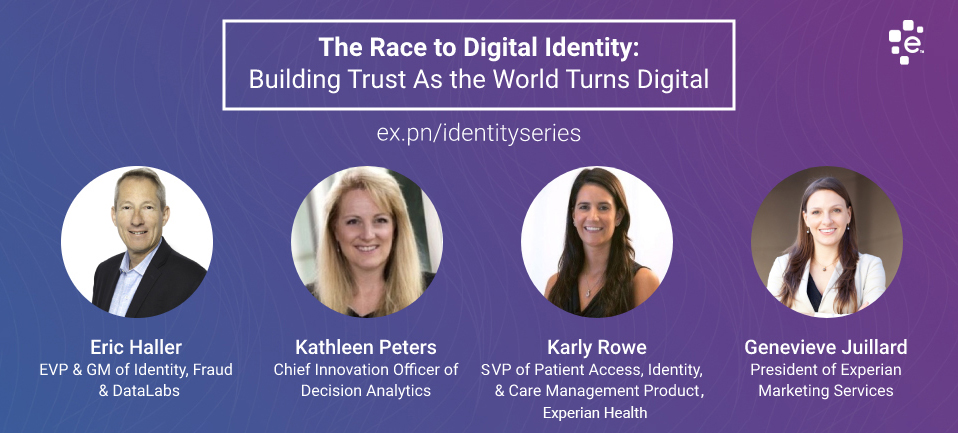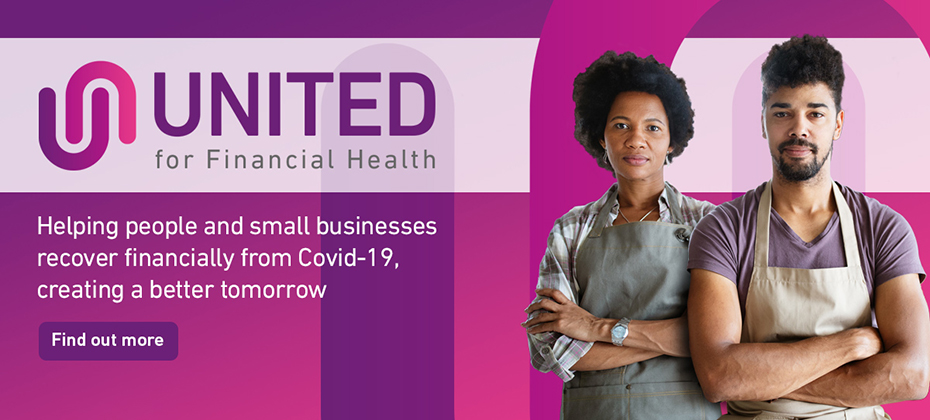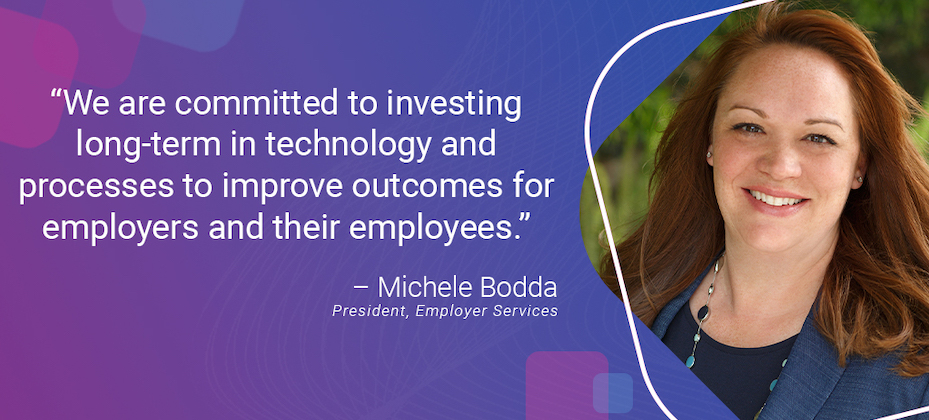Innovation
At Experian, we are continually innovating and using technology to find solutions to global issues, modernize the financial services industry and increase financial access for all. Read about our latest innovation news below:

With data technology and innovation as the backbone of our company and with our commitment to celebrating diversity, we are proud to share an incredible recognition: AnitaB.org has named Experian North America a Top Company for Women Technologists. Organizations on this list are committed to building workplaces where women technologists can thrive, and this honor is considered an industry benchmark for progress toward equity. Our culture of inclusion internally at Experian fuels our innovations to achieve financial inclusion externally. Being named a Leader by AnitaB.org for the second time affirms we’re moving in the right direction. September has been a big month for us: we also earned a place in Fortune’s Best Workplaces for Women and PEOPLE’s 100 Companies That Care 2021 lists for the first time. My colleague and fellow leader for our Women in Experian employee resource group Karen Tatten shares my sentiments: “It’s fantastic to see our efforts to hire, promote and retain top female talent recognized in the marketplace. It’s a tremendous honor and reminder to all women in Experian of why we chose Experian for our career journey.” At Experian North America, men and women are promoted equally. More than half of our new hires and close to half of all employees identify as women. Former Chief Executive Officer Craig Boundy was recently recognized as a Best CEO for Women by Comparably, an acknowledgement especially meaningful because the award relied solely on the input of employees. Even with these accolades, we strive for better. This year, we are committed to a specific goal for the company globally to help close the gender gap. By 2024, Experian pledges to increase the proportion of women in our executive committee and direct reports to 30%, our senior leaders to 40%, our mid-level leaders to 42%, and our total global workforce to 47%. We look forward to sharing our progress.

At Experian, we are continually innovating and using technology to modernize the financial services industry and satisfy the real-time data demands of consumers and businesses. Therefore, we are thrilled to rank #11 on the 2021 IDC FinTech Ranking. This is an impressive jump from #45 last year. Experian has a rich history of helping financial institutions with a wide range of challenges, including opening-up credit to underserved communities, adapting to changing consumer expectations and behaviors, addressing the growing threat from fraud, and becoming a more agile technology provider in an ever-changing market. We help thousands of businesses lend responsibly, provide services quickly and seamlessly and protect against fraud, and have continued to do so even during the testing times of the last year and a half. The robust data assets of Experian, combined with best-in-class modeling, decisioning and technology are powering new and innovative solutions. Experian continues to heavily invest in new technology and infrastructure to deliver the freshest insights, at the right time, to make the right decision. Our technology helps transform the way businesses operate and consumers thrive today. We believe every consumer deserves access to fair and affordable credit and are committed to helping our clients better serve and provide greater financial opportunities for everyone. The 18th annual fintech ranking represents the leading hardware, software, and service providers to the financial services industry from around the world. Vendors are ranked based on 2020 calendar year revenues and the percentage of revenues exclusively attributed to financial institutions, including banks, capital markets firms and insurers. View the list in its entirety here. The ranking also refers to Experian as a “Rising Star."

The way we identify ourselves is ever-changing. The growth of the digital world has played a huge role in this. Identity used to be based on basic information: phone numbers, driver’s license information, information in a telephone book, etc. Now, as our world is moving more towards online preferences due to the COVID-19 pandemic, and people are identified by cookies, website preferences, usernames, and other identifying factors on their devices. As identity races towards a more digital perspective, we must be wary of how we can use this information to provide better customer experiences and how it can easily be stolen and taken advantage of. Experian held a special series as part of our DataTalk podcast that focused on the importance of identity and how Experian is utilizing identity throughout of different businesses. The series also looked at how Experian is constantly innovating to ensure our technology and data are being used to create the greatest benefits for our clients and their customers. Every week, Experian’s Director of Social Media Mike Delgado and Experian’s Social Media Specialist Destiny White are joined by data science leaders around the world for the #DataTalk podcast. Why authentication is important The challenge companies are facing is how to digitally identify individuals while maintaining a positive customer experience. They need to rely on new technologies including data, biometric, identity graphs and AI. Eric Haller, Experian’s EVP & GM of Identity, Fraud & DataLabs, speaks on these technologies as a guest on an episode of DataTalk. Businesses need to be able to separate real consumers from the bad guys and authenticate that they are who they say they are. Technology allows business to add secure measures that proves someone’s identity without causing too much friction. For instance, looking at information such as timing and mouse movement in an IP address will help quickly differentiate between a bot and a human. These methods are extremely important in protecting users in their e-commerce journey, something many individuals are utilizing more than ever since the COVID-19 pandemic. Being able to authenticate who someone is helps detect suspicious activity and differentiate between a fraud and a genuine identity, eventually protecting consumers from stolen information and the destroying of credit as well as the ability to take out loans. Using a layered approach to verify identities Kathleen Peters, Experian’s Chief Innovation Officer of Decision Analytics in North America, discusses in her episode of DataTalk how Experian helps protect consumers and businesses from fraud. She explains that identity is dynamic and the information that makes us who we are is always changing. In the past, people were identified by PII (Personally Identifiable Information). Now, we rely on information such as usernames and passwords, cookies, websites visited, and online preferences to create one’s identity. Due to this shift, Peters highlights the importance for businesses to build trust with customers. Because fraudsters have more access to credentials, businesses need to put the right advanced analytics and technology in place to validate and protect identities. Fraudsters are motivated and organized, therefore businesses need to use technology to stay one step ahead. The best thing businesses can do is to implement a layered approach so that they can have the right tools for the right time and apply the right level of authentication. Since our digital-first world is here to stay, businesses must ensure that they have the right tools in place to be agile in how they continually adapt and interact with consumers who are open to more practical means of security. How identity plays a role in healthcare Once trust is established and technologies that assist in authentication are utilized, many industries could benefit such as the healthcare industry. This industry has been under attack during the COVID-19 pandemic and it is important more than ever to avoid making identification mistakes. Karly Rowe, SVP of Patient Access, Identity, and Care Management Product at Experian Health, explains as a guest on DataTalk that data and technologies from Experian have been used to identify patients more accurate than ever, schedule appointments easily and even assist in contact tracing of COVID-19. This is done by using powerful data to fill in information on patients in order to authenticate them as well as find and contact them regarding any exposure to this virus. What marketers and advertisers can do with data and identity On top of contributing to the healthcare industry, Experian has also been using data and technology in the marketing industry. Data, analytics, tools and software are being provided to marketers and advertisers to deliver relevant messages to customers across their most preferred digital channels. Genevieve Julliard, President of Experian Marketing Services, explains in her DataTalk episode how identity is becoming more important than ever with the elimination of third-party cookies. Experian is embracing diversification of new identifiers across the information ecosystem to combine offline and online identity and data assets. With this approach, Experian is able to assist marketers by providing them with a clearer view of their customers across the buying journey and seamlessly deliver relevant content across all digital devices. No matter where the digital world takes us and what it means for identity, Experian is always embracing technology in order to keep up with the needs of its consumers. We use data and the most advanced technologies to confirm individuals, which makes us a leader in identity verification.

Every day at Experian, we are investing in new technologies, talented employees and innovation to help all of our clients maximize every opportunity we have to offer. We are honored the work performed under Eric Haller in our DataLabs received the San Diego Top Tech Awards of 2021. The awards honor technology executives who truly stand out by innovating. In 2010, Experian DataLabs was established to develop and drive creation of innovative products generated from breakthrough experimentation leveraging artificial intelligence, machine learning, advanced analytics and data assets from a variety of sources across Experian’s businesses in 37 countries. Eric originally pitched the idea of DataLabs and received funding for 8 people to begin the first lab in San Diego. Since then, Experian DataLabs has expanded its labs to London, Sao Paulo and Singapore. New products developed in the labs cover mobile, payments, consumer & commercial credit, fraud, targeted marketing & healthcare. During the last year and a half, Eric and his team continue to develop offerings and create new technologies to support the community. In May 2020, in conjunction with the company’s healthcare business, Experian DataLabs developed a free interactive heat map of geographic populations at-risk of being most susceptible to developing severe cases of COVID-19. The Experian COVID-19 Outlook and Response Evaluator (CORE) tool is guiding healthcare organizations and government agencies with planning for the “new normal” and COVID-19 recovery. In addition, Experian DataLabs develop other important initiatives such as the Covid Radar in Brazil to help people, small businesses and governments. Produced in collaboration with 50 organizations, including the United Nations, Amazon, SAP and the University of Sao Paulo, COVID Radar helps the coalition track where supplies are needed most. The coalition delivered tools, equipment, PPE and other supplies to Brazil’s most vulnerable zones. The second part of the initiative focused on aggregating and analyzing the data to create forecasting models that allowed researchers to track various key indicators that has helped dictate what officials should do with lockdowns and provide data around ICU beds and assess what the demand is. As part of Experian’s culture of innovation, Eric inspires his team to innovate due to his inclusive nature, openness, and willingness to listen to new ideas. The AI and revolutionary technology that Experian DataLabs is utilizing is enabling the company to continuously fuel new projects in its pipeline and turn ideas like the COVID Radar and the CORE heat map into a reality faster than ever before.

There are times in most of our lives where we can't get access to the financial system in a way that we want. Be it for a mortgage, a car, or a business loan. We've all experienced the frustration when you feel you're on the outside of the system and you can’t do the things you want for yourself or your family. At Experian, it's our job to change that. We want to make sure everybody is included and has access to fair and affordable financial products. Financial inclusion is fundamental to our business. With our focus on increasing access to financial services, improving financial literacy and confidence, and helping people manage their financial lives; we help power people and businesses to create their future. In fact, the United Nations includes access to financial services, such as credit and microfinance, among its Sustainable Development Goals. Access to affordable credit opens the door to opportunities for people to transform their lives – from homes and healthcare to education and entrepreneurship. This has never been more important than it is today. Creating a Campaign to Drive Financial Health Worldwide As the pandemic took hold in 2020, we stepped in with data and analytics to support governments, health services and national emergency response efforts through major initiatives such as COVID Radar in Brazil and Experian CORE (COVID Outlook & Response Evaluator). These are just two examples of how we can use our data and expertise to make the biggest difference to society. It soon became clear that the impact — not just on physical health, but on financial health — would be far-reaching for people around the world. We looked at how we could use our expertise and resources to help vulnerable communities through the crisis and focused on financial education as the best way to strengthen their resilience and support their road to recovery. We launched our United for Financial Health programme. We rapidly established 11 NGO partnerships across our biggest consumer markets to deliver targeted financial education for some of the communities hit hardest by COVID-19. By the end of the year, we had reached nearly 35 million people, more than double our original goal of 15 million, and we’re not stopping there. We aim to reach 100 million people by 2024. Part of our efforts include our member relationships around the world. This year, we surpassed the milestone of 100 million direct relationships with consumers globally and delivered further innovations to support people through our business, with the launch of products like Experian Boost in the UK and Serasa Score Turbo in Brazil. This, of course, is on top of our ground-breaking Experian Boost launch in the United States in 2019. Our goal is to have a direct relationship with as many people as possible; to truly become the Consumers’ Credit Bureau and power financial opportunities for all. Driving Innovation with Social Purpose Our culture of innovation helps us harness opportunities to drive business growth. We are continually investing in product innovation and new sources of data to address emerging market opportunities that can make a real difference to global communities. In 2020, around 1,000 “innovators” from across Experian joined our annual Future of Information Conference, which was held virtually because of the pandemic, to encourage them to think differently in their work. Topics included fairness in artificial intelligence, transforming agribusiness and enhancing the consumer healthcare experience. Teams at our DataLabs in Brazil, Singapore, the UK and the USA tap into our culture of innovation to continually create new solutions to global challenges. The result of all this is that our Social Innovation products have now reached 61 million people since 2013. We aim to reach 100 million by 2025. As John Hope Bryant, CEO of one of our NGO partners Operation HOPE, says, “Experian’s commitment to unlocking the power of data to create opportunity means more people will be set up not just to survive, but to thrive in the months and years to come.” In this year’s Sustainable Business Report our commitments come through stronger than ever. We are raising our ambition and aiming to reach 100 million people through our social innovation products by 2025. Our goal is to reach 100 million people through our United for Financial Health campaign by 2024. We have also pledged to protect our planet by becoming carbon neutral in our own operations by 2030. We know we’ve got more work to do and we remain focused on using our business to make real and sustainable change. With social innovation running so deeply through the core of our culture, and our commitment to improving global financial health front and centre of our thinking, we will continue to push to find new solutions to help people, serve communities and protect the environment, helping to create a better future for all. All of this is very personal to me. I passionately believe we can and should drive to make a difference in society. I serve as executive sponsor of our ESG programs and this isn’t just another corporate program, it’s at the heart of what we do as a company to power financial opportunities. My personal pledge is to continue to keep you updated, as we progress our agenda to sustainable environmental and societal change. Read the full SBR report here.

At Experian, we create a better tomorrow by powering opportunities for consumers, customers, our people and communities. We use the full range of our capabilities to drive financial education and inclusion, and one of the ways we do this is through our United for Financial Health programme. I am delighted to announce the launch of this important programme in two of EMEA’s markets today. We’re excited for the positive difference our two new partnerships will make to help vulnerable consumers financially recover from the impacts of Covid-19. In Italy, incidents of domestic violence have increased considerably during the global pandemic, with the Italian National Institute of Statistics reporting a 75% increase in calls to anti-violence helplines in 2020 alone. Further statistics show women are particularly affected by unemployment due to Covid-19, reducing victims’ financial independence and their ability to escape from situations of abuse. The increase in domestic violence since the onset of the pandemic has also been highlighted globally by the UN. To help those impacted, we intend to partner with MicroLab and Microfinanza, who support women victims of domestic violence, foreign caregivers, and young people not in employment, education or training (NEETs). Our partnership aims to help these people access credit, so they have the financial means to improve their current situation, and take steps toward creating a better tomorrow. We will collaborate to deliver financial education, and we intend to develop an app that captures open (non-traditional) financial data to help them build their credit profiles. In South Africa, unemployment stands at 32.6%. A large proportion of people in the country run or work for small to medium-size enterprises (SMEs). By helping these organisations access affordable credit so they can continue to operate through the pandemic, we believe we can have a tangible impact on people’s employment. We will partner with the National Small Business Chamber, a non-profit membership organisation that supports SMEs. Together, we will educate small business owners on their financial and credit health, empowering them to improve their personal and business credit profiles to access the funding required to maintain and grow their businesses. Combined, we estimate our partnership with our NGO partners will reach 3.8 million consumers, helping deliver on our Company’s commitment to reach 100 million people by 2024. We start work on these projects today on our path to creating a better tomorrow.

You may have recently seen the announcement of Experian’s new Employer Services business. While we have a longstanding history of serving multiple industries, we recognize some may wonder what prompted Experian to enter this space. It may even seem like a means to another end. In an effort to dispel any preconceived notions, I’d like to highlight what led us to invest in this business, how we plan to address employers most pressing pain points as employees return to work and what the industry can expect from us. The truth is our clients asked us to enter the employer services market. Employers have been seeking alternatives to legacy services. They’ve been asking to have a company of Experian’s scale and capabilities fill in the gaps, invest in innovation, and provide high-touch customer support. Essentially, our goal is to deliver on their ask and be an indispensable partner to employers across the U.S. Here are three ways we are bringing this vision to life: 1. The industry’s best and most trusted providers are now part Experian. A critical piece of our strategy is to bring together the best the industry has to offer. We have a solid track record when it comes to acquiring companies who disrupt industries with innovative solutions to difficult problems. So, we scoured the market to identify companies that would allow us to provide unmatched human capital management expertise. Through our acquisitions of Emptech, Corporate Cost Control (CCC), and Tax Credit Co. (TCC), I am confident we have assembled the best-of-the-best. Individually, each company has a trusted reputation for providing unmatched service to some of the most recognizable brands. As we come together, we are leveraging our combined capabilities to deliver secure, scalable and transparent services to even more businesses. We can assist employers across industries with streamlining complex and time-consuming Human Resources activities and support their finance team’s tax credits processes, through services including: Electronic I-9 verification management Unemployment claims management Employment and income verification fulfillment Tax credits and incentives management, including Work Opportunity Tax Credits (WOTC) Ultimately, we are helping employers turn workforce management into a competitive advantage by improving candidate and employee experiences, safeguarding employee information and maximizing the benefits of various tax credits programs. By leveraging our experts, our clients can spend more time focusing on their people. 2. Our services are backed by high-touch customer service and powered by industry-leading innovation. While we are rightfully recognized as the largest credit bureau in the country, I’ve personally seen our business grow over the past 20 years into something much more than a credit bureau. We are a global technology company and market leader in business insights and analytics, focused on empowering consumers. We invest heavily in innovation across a wide spectrum of industries, and we are committed to investing long-term in technology and processes to improve outcomes for employers and their employees. In fact, Experian has been recognized as one of the most innovative companies in the world by Forbes for several years – for our work in all of the industries we serve. At the same time, our services are delivered with the highest standards of data privacy, accuracy, security and transparency. Our clients will always know how their data is being used and how it benefits their employees. Our business continues to evolve to deliver world-class services for our clients and consumers. We’re bringing this same innovative mindset and focus to meet the evolving needs of employers. 3. We’re “All In” on Employer Services. While we recognize the employer services space was ripe for innovation long before the pandemic, the ensuing stay-at-home orders, rising unemployment, reemployment and legislation changes created a perfect storm for employers, Human Resources and finance professionals. We’re facing an entirely new set of workforce challenges today. Whether you need unparalleled unemployment claims management, tax credit expertise, verification of income and employment reliability and transparency or work eligibility certification, we’re here to bring the best Experian has to offer to help and we’re going all in. Our promise is that we will listen to our customers to understand their unique needs and invest to provide the capabilities and high-touch service tailored to best serve them. We know employers need a partner they can trust, who is focused on their business and their employee’s experience and who will bring new ideas to the table on managing a complex workforce in this ever-changing environment. We have the teams in place with deep expertise to tackle the toughest challenges. We’re thrilled to be here, and we’re committed for the long-term. You can learn more about our Employer Services business by visiting www.experian.com/employer-services.

The use of digital payments continues to trend upwards. While the pandemic pushed consumers online quickly out of necessity, it has since become a preference due to the convenience factor. As businesses transform their operations to accommodate this rapidly growing volume of digital transactions, they must factor in the additional vulnerability caused for online fraud and identity theft. At Experian we are committed to helping our clients improve the customer experience, while at the same time protecting consumer identities and information. Experian was recently acknowledged in Juniper Research’s Online Payment Fraud Deep Dive Strategy & Competition 2021-2025 as an established leader in fraud detection and prevention. Juniper Research, one of the leading global analyst firms in the mobile and digital technology sector, scored Experian high for their marketing & branding strength, service range & features, financial performance in the sector, experience in the sector, operations & global reach, partnerships, creativity & innovation, and future business prospects. View infographic with key fraud trends According to Juniper Research, “Experian continues to invest into its fraud detection and prevention solution and uses its vast array of customer data to deliver an effective set of solutions across the entire consumer journey, from onboarding, through account management/account takeover and transaction risk mitigation.” The reports highlights Experian CrossCore platform noting, “Experian leverages a combination of proprietary solutions and partner capabilities and data – integrated into its CrossCore platform – where it leverages a robust machine learning approach that takes into account these dynamic sources of data.” All of Experian’s fraud detection and prevention services are available through Experian’s CrossCore partner ecosystem, which combines advanced analytics, rich data assets, identity insights and fraud prevention capabilities. Businesses using the Experian CrossCore partner ecosystem can connect any new or existing tools and systems in one place to quickly adjust strategies based on evolving threats and business needs, which helps to improve efficiency and reduce operational costs. Learn more about the CrossCore platform here.

The financial services industry is poised to take advantage of the unprecedented availability of accurate, comprehensive, and timely data. Through increased lender adoption, the growing array of insightful data can create meaningful change and provide access to credit for more consumers and businesses than ever before. At Experian, we feel we have a responsibility to consumers seeking credit. Ensuring lenders can obtain the insights needed for responsible lending is key to supporting this. By leveraging the most accurate traditional credit data as well as expanded data sources that improve how risk can be assessed for thin-file or no-file consumers, lenders can form a precise picture of an individual’s financial situation and improve financial access for millions of Americans who have been unfairly excluded from the credit ecosystem. Extend credit responsibly. Some of the most predictive information available today is employment data, including how long a consumer has been at a job and how much they earn. Layering verified income and employment information with credit data can improve financial outcomes for consumers and help lenders say ‘yes’ when they otherwise couldn’t or wouldn’t. To help, Experian has released Experian Verify™ - a suite of solutions that provide lenders with real-time access to verified information about a consumer’s income and employment status. Through Experian Verify, credit card, personal loan, auto and mortgage lenders have near-instant access to millions of active employer records to verify an applicant’s income and employment status for use across the lifecycle, including pre-qualification, originations and account review. The products are powered by Experian’s growing network of exclusive employer records and payroll partner data, which includes data from recent acquisitions of Corporate Cost Control (CCC), Tax Credit Co. (TCC) and EmpTech. We are answering the industry’s call for change in income and employment verification while providing lender’s with deeper insights to increase financial access. Putting consumers in control. This is the latest example of many that illustrate our commitment to improve financial access for consumers. The new products complement Experian Boost – a free tool that empowers consumers to contribute their on-time telecom, utility, streaming services and mobile phone payments directly to their Experian credit report. Incorporating this information has been proven to increase the predictiveness of a consumer’s credit reputation and can complement the data derived from their lending history. Experian Boost provides consumers with the ability to immediately impact their credit scores, while providing lenders with deeper insight into a consumer’s financial situation. With Experian Boost, nearly 70 percent see an uplift in their credit score. Since the product was released in 2019, more than 7 million consumers have connected to Experian Boost with over 50 million cumulative points added to FICO Scores. The financial impact to the industry is significant, with Experian Boost users gaining access to more than $1.7 billion in credit as a result of improved credit scores. Serving credit invisibles. Our commitment to consumers does not end there. Through our investments in expanded data sources and advanced analytics, we are helping lenders identify consumers who are excluded from the traditional credit ecosystem, but who can fulfill their financial obligations and pay responsibly. Experian Lift, our suite of lender credit scores, has the potential to help more than 40 million credit invisible consumers gain access to credit while providing first and second chances to millions more. Experian Lift uses proprietary technology, advanced analytics, and machine learning models to combine exclusive credit data attributes, trended data and expanded Fair Credit Reporting Act (FCRA) regulated data sets. This combination of data and technology is creating new opportunities for consumers who are often overlooked. Looking ahead. Data has the power to unlock financial opportunities for millions of consumers. Collaboration between Experian, lenders and consumers that is informed by data is key to keeping the economy flowing and improving livelihoods of Americans. As we look to the road ahead, we are committed to working side-by-side with lenders, credit scoring companies and consumers to eliminate credit invisibility and improve financial equity and access.